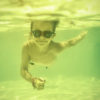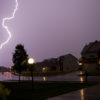A home swimming pool is one of the greatest pleasures that can be shared with your family. Splashing around is refreshing, and kids love all the fun that a swimming pool for friends and family brings into their days. However, Pool Troopers recommends certain tips and precautions that you should keep in mind when sharing your swimming pool with your children or grandchildren.
Safety First
According to CDC data, kids between the ages of one and four are most at risk of drowning. The good news is that certain safety measures and gadgets can prevent a child from getting into the pool on their own with no supervision. These include:
- Fencing around pool separating it from the home
- Self-closing gate latch
- Alarms on doors leading to the pool
- Rigid pool cover
- Underwater motion swimming pool alarm
Vigilant Supervision is imperative when kids are using the pool. It is advised by the U.S. Lifesaving Association to “…never, ever leave a child alone in a pool, even for a few seconds.” Distracted, non-active supervision is as bad as not watching. Child drownings usually happen silently and quickly, you must be an active Pool Watcher when children swim – no distractions: no cell phones, no social media, no conversations, no going inside to check the oven or answering the door.
Another good rule of thumb is to not leave toys around the pool, as children are attracted to them and then head to the water. Knowing CPR and always having a phone nearby in case of emergency are also wise precautions.
Drains
Hair, body parts, and loose bathing suits are at risk of being sucked into the pools spa drains and suction ports, especially if children are playing near them. Make sure that the pool has drain covers that are anti-entrapment. Newly constructed pools have dual main drains to reduce suction entrapment hazards, but older pools do not. Make sure your pool is updated with the latest drain technology for anti-entrapment and anti-hair snare. Always make sure drain covers are securely attached and never swim or let others swim in a pool that has missing drain covers.
Pools with only one drain should be equipped with a safety vacuum-release system, in case the drain is blocked. Please consult a licensed pool professional in your area should you have any questions about your drains or covers.
If your pool has an open side suction port it must have a safety cover installed before allowing swimmers in the pool! You can also have a pool professional convert the line to a pressure line or eliminate it from the pool system and cap it off permanently.
Always keep a watch on children and prevent them from playing and swimming near drains or suction ports. Long hair should be tied back or in a cap, and swimsuits should fit snugly.
Swim Lessons
Make sure the children know how to swim, as developing coordination and strength are part of safety in the pool. Even if the child has had lessons, keeping an eye on them is prudent. Even very active children who are confident swimmers will fatigue in pools and more so in colder water.
Pool Hygiene
Keeping children safe from germs and infections when using a pool with friends can be as simple as following some tips on pool hygiene. The following is suggested by the CDC and Pool Troopers:
- Don’t swallow the water
- Only swim in blue, clear, odorless water
- Never swim in cloudy, green, or smelly water
- Shower before you get in the water
- Take kids out for bathroom breaks every hour
- Check diapers and change them in the bathroom, not by the pool
- Reapply sunscreen to kids
- Make sure kids drink plenty of fluids
- Wash hands with soap after bathroom
- Teach kids not to use the bathroom in the pool
You might want to test the free chlorine levels in the pool before using it as well. Check out the testing entry in the Pool Troopers blog.
Pool Troopers wants your family to be safe and these tips will help you when your kids and grandkids are enjoying the pool. Browse our blog to learn more about pool care, then contact us for any questions you might have regarding maintenance, repair, drains, and equipment.




